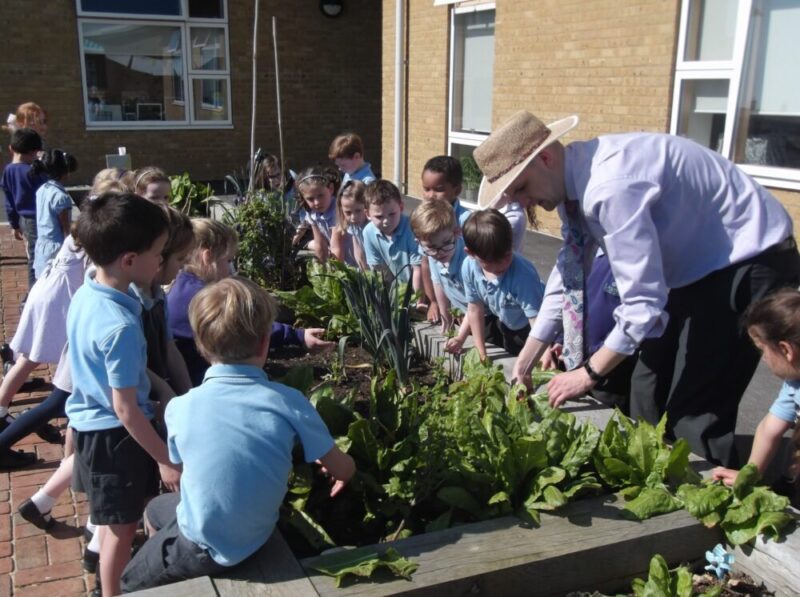Oriel Square’s Sustainability Classroom Expert, Edd Moore, explains how he has put sustainability at the heart of his school, enabling each child to leave Damers First School with a real awareness of the local, national and global environment and how they can make a genuine difference.
Sustainability in education
Edd Moore joined Damers First School in Dorchester, Dorset, in September 2012. In the intervening decade, he has brought environmental awareness and action to the heart of the school. In those years Damers has been recognised for its contribution to improving the environment in many different ways and has become an example to schools both locally and across the UK.
The journey began with accreditation as an Eco-School. This charity operates the biggest educational programme on the planet and is run in England by Keep Britain Tidy. Schools travel through a seven-step programme to be awarded Green Flag status. Damers achieved this status in 2016.
What makes an Eco-School?
“Eco-School operates the biggest educational programme on the planet”
At Damers, every class has an Eco-Ambassador and together these children make up the Eco-Crew. Each term, every class makes a pledge to help animals, people or the environment. This programme gives children the ability to voice what they care about, and has developed their confidence, determination and resilience.
“Every class makes a pledge to help animals, people or the environment”
Through this programme, the children and the school have forged relationships with businesses and organisations that are driving climate action. One link is with City to Sea which runs the ‘Refill’ campaign to reduce plastic bottles. The children have worked with local businesses to sign them up for the scheme, signing up over 18 in one day. The school also became an ambassador for the eco-friendly cleaning supplies company Delphis Eco. Recycling is a key part of the action the children take, setting up their own recycling centre, which raises money for the school’s wildlife area. Damers became a Surfers Against Sewage Plastic-Free School in 2018. This national campaign aims to eradicate single-use plastic. Part of the process to be accredited involves using your voice to create change, and children at the school wrote to local headteachers asking them to consider joining the campaign. Damers’ pupils have taken lots of action to influence change, from being part of a local government climate change panel to working with local secondary schools on reducing plastic, and have spoken to influential people including King Charles III, Michael Gove and Jane Goodall.
An important part of the approach is embedding the natural world into the curriculum, with the focus being on the children learning from nature, not about nature.
In Summer 2022 we asked Edd to tell us more about his sustainability in education journey.
What has been the biggest challenge you’ve faced in putting sustainability at the forefront of your school’s agenda?
The biggest challenge at the very start of our eco journey, a decade ago, was encouraging staff to come on board and embed this within their classrooms, teaching environment to the children. This was done by showing staff all the benefits it would have to our school, the children, staff, community, and curriculum. It was about proving to staff that it was not going to be another added extra to an already packed curriculum.
What achievement are you most proud of?
Winning the awards for: Eco-Schools Primary Eco-School of the Year; Jane Goodall Roots and Shoots School of the Year; and Surfers Against Sewage Plastic Free School Champion of the Year were all important achievements.
More broadly, embedding nature and the environment within the curriculum and it being part of the ethos of the school and creating a legacy, is my biggest achievement. Children feel empowered and know their responsibility in looking after our environment at school but also how they can inspire others at home and in the community to make sustainable changes too.
The children have been given the confidence to stand up in front of hundreds of businesses, council members, councillors, and their local MP to speak about their environmental passions, concerns, and ideas and tell these people with power what they can do to improve sustainability locally, nationally and around the world. The children do not take no for an answer. This has included making Dorchester as single-use plastic free as possible. The children gave up their weekends, after-school time and school holidays to go into businesses and persuade them to remove at least five single-use plastics or replace them with sustainable items. To date, the children have signed up just over 100 businesses across the town.
Instilling environmental passions within children at an early age and empowering them to take action will encourage them to take it forward in their learning as they grow older, moving on to other schools, universities and potentially having an environmental job too.
How do you measure the impact of your work on the children and on the environment?
The impact is measured through the work the children produce which is showcased at the end of each half-term when the parents are invited in to hear about what they have learned. Their work is also published on class blogs at the end of each week. The children do an audit of the school’s environmental work every year to see where we are doing well and what we need to improve. From this audit, an action plan is put together of what we need to work towards to become zero-carbon and achieve the Eco-Schools Green Flag. The children collect and analyse data to see what impact the school is having on the environmental topics we are working on.
As a primary school governor at a school who has signed up for the National Governance Association’s Greener Governance campaign, Claire is taking inspiration from Edd and the speakers and exhibitors at the Festival of Education to take the next step on the sustainability journey at her school. She’ll report back later in the year on the impact and the lessons learned so far.
In part one, we reported on the Department for Education’s climate change strategy, launched in April 2022. You can now read part three of this blog series, where Claire takes the lessons she learned from Edd to her local primary school and reflects on the journey so far.

